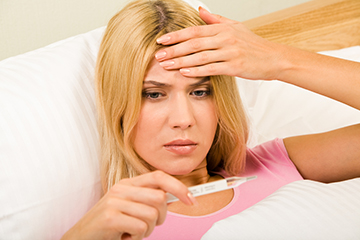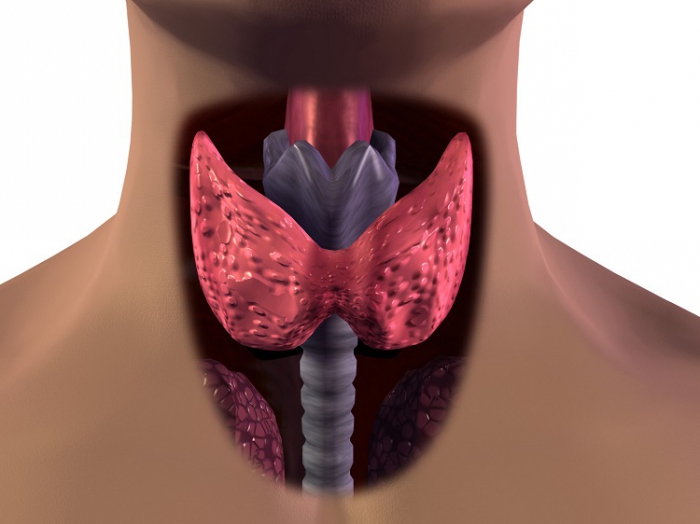How do you know if you have a thyroid gland? Changes in the female cycle. Body weight and thyroid hormones.
Hereditary predisposition, lack of iodine in the body, diseases of the digestive tract cause problems with thyroid gland among women. Symptoms of goiter are often similar to manifestations of other diseases.
Thyroid dysfunction is more common in women than in men. High/low hormone levels cause dysfunction various bodies.
Luckily, they meet a doctor who catches them. He explains what is happening to them and gives each one the right medicine. Then they go much better and can resume their games. This gland regulates the functioning of many organs and metabolism by sending out messengers, thyroid hormones. If the thyroid gland does not produce enough hormones, body functions tend to slow down: this is hypothyroidism, Hypo disease. If, on the contrary, it produces too much, the functions of the body tend to accelerate: this is hyperthyroidism, Hyper's disease.
How to understand that it is time to urgently take tests for the level of thyroid hormones? Let's figure out how to identify thyroid problems in women. Symptoms to watch out for.
Many women visit an endocrinologist only when absolutely necessary, despite the abundance of symptoms indicating problems in the work of an important gland. In most cases endocrine system fails in the interval of 30-50 years.
Parents love stories, but not children anymore. What are their treatments? The site also provides access to all a large number of documents or videos to deepen subjects of your choice. A relay is also planned in in social networks patient associations.
As usual for thirteen years, Ann-Sophie went to the drugstore for her box of Levothyrox medication needed for her thyroid problems. We are at the end of March. Ann-Sophie, like other patients, sees only a "harmless" detail in her. Especially since his pharmacist assures him it's a "purely cosmetic" change. “He told me there was no change in the production of the drug,” recalls a 36-year-old woman with thyroid nodules. However, there is an endless fatigue that lasts for months.
General reasons:
- workload, stress, minimum night rest;
- insufficient attention to their health;
- unhealthy diet, bad habits;
- absence preventive measures to prevent thyroid problems.
Specific reasons:
- excessive / insufficient intake of iodine in the body;
- congenital pathologies of the thyroid gland;
- iodine is not absorbed due to pathological processes in the stomach, intestines, with liver diseases;
- lack of important hormones due to lack of iodine.
"Link building" would require "first press articles". Many patients describe the "anger" added to the "clubbing" that took many months to reach the right dose for their treatment. In unison, the net surfers evoke a "sickly body" intersected by "violent muscle cramps". A body that is "loose and draining", like Eliza, 58 years old.
Some also report "skin problems", eczema flares, severe itching, acne rosacea or "huge hematomas". Michel, on the other hand, "no longer maintains any heat source." These symptoms are usually accompanied by significant consumption or weight loss, dizziness and intestinal disorders.
Inattention to the activity of the thyroid gland provokes a violation of lipid, carbohydrate, water metabolism, improper functioning of various systems.
Take tests for thyroid hormones, perform ultrasound and scintigraphy of an important organ.
Symptoms
How to recognize the symptoms of thyroid problems in women and the development of dangerous pathologies? Analyze if you have one or more signs that appear when there is a deficiency / excess active substances produced by the thyroid gland.
The question returns as a keynote: How long have these side effects go before the situation stabilizes? The Internet users who responded to our call for recommendations mostly consulted with their doctor who prescribed the blood. Some are still waiting for results.
Eliza made a radical and controversial decision: I stopped everything. Eliza made a radical decision, highlighted by the lab: I stopped everything. Wednesday, August 23, at the National Agency national security medicinal product, seized by the French Association of Thyroid Patients, a free number was established.
Be sure to get tested if you find the following symptoms violations of the work (function) of the thyroid gland:

- develops increased appetite, but the weight falls;
- frequent sweating of the body, palms;
- fever, desire to warm up even when optimal temperature air;
- significant change in emotional and physical activity: from complete relaxation, apathy to an irrepressible thirst for action.
There are other signs of thyroid problems:
Will the drug company be able to give me all the time I wasted being drugged with depression instead of normal life? Laetitia is asking the lab to "take responsibility" so that patients no longer live in this "failed state of health". Lawrence, 51, believes that by changing this formula without patients, the lab is "playing with our health with impunity."
In the general population, a number of known possible complications observed in people suffering from thyroid disorders. Iodine deficiency or autoimmune destruction of the thyroid gland results in reduced production of thyroid hormones. In response, thyroid-stimulating hormone is released by the pituitary gland to stimulate the growth of the thyroid gland. The thyroid gland, which can cause a goiter.
- weight gain with a decrease in appetite;
- bulging eyes;
- causeless, abrupt change moods: aggressiveness, anxiety or tearfulness;
- tachycardia (increased heart rate for no apparent reason)
- change in the nature of the menstrual cycle.
Visit an endocrinologist, get tested for hormone levels. When identifying pathological changes, again make an appointment with a doctor to clarify the diagnosis, start therapy. To save time, visit the multidisciplinary medical center.
Hypothyroidism can lead to increased accumulation of low-density lipoprotein, leading to an increased risk of heart disease. Long-term hypothyroidism can cause damage to peripheral nerves. It is thought that this may be due to long-term metabolic dysfunction, although the link is not well understood.
Insufficient levels of thyroid hormones can affect ovulation, altering fertility. Hormonal treatment hypothyroidism cannot fully restore fertility. Children born to women with untreated thyroid disease may be at increased risk birth defects development than children born to healthy mothers. These children are also more prone to severe intellectual and developmental problems. Babies with hypothyroidism at birth are at risk serious problems physical and mental development if left untreated.
Pregnancy planning: milestone in a woman's life. If you want to start healthy baby, you should pass a complex of tests, including a blood test for TSH. This article will tell readers about the role of thyroid-stimulating hormone analysis in planning a child.
About the activity of hormones
The thyroid gland regulates several types of metabolism, is responsible for the smooth functioning of the immune, nervous system, controls the activity of the heart, blood vessels. Any violation of the level of hormones affects the state of the reproductive system.
If the disease is diagnosed and managed in the first few months of life, the chances of normal development improve significantly. Enlargement of the thyroid gland, often due to over-stimulation of hormonal production. High thyroid hormones can cause tachycardia, atrial fibrillation, and congestive heart failure.
Prolonged increases in thyroid hormone levels can lead to osteoporosis through the inability to incorporate calcium into the bones. Patients with hyperthyroidism may develop ocular disorders including bulging, red, or puffy eyes, sensitivity to light, and visual disturbance.
Briefly about thyroid hormones:
- Free T3 is the active fraction of thyroid hormones. The level speaks volumes hormonal background organism.
- TSH - an indicator indicates the level of activity of the pituitary gland - an important gland that controls the entire endocrine system.
- T4 free - the level of thyroxine (a less active fraction of thyroid hormones) reflects the nature of the functioning of the thyroid gland.
- Calcitonin is a special hormone that controls the exchange of phosphorus and calcium. Analysis of the level of calcitonin is important in the detection of cancer.
- AT - TPO. Antibodies accurately reflect the presence of autoimmune pathologies in the body.
- AT - TG. An increased amount of antibodies to one of the important thyroid proteins is recorded in autoimmune pathologies of an important organ.
Patients with hyperthyroidism may develop dermopathy, causing redness and swelling, often on the legs and feet. Hyperthyroidism carries the risk of a thyroid crisis - a sudden increase in symptoms leading to fever, tachycardia, and even delirium. The thyroid gland secretes hormones necessary for the activity of all cells.
Thyroid gland, capricious gland
Despite small size, the thyroid gland is extremely sensitive to our living conditions. Fasting or long term physical stress may interfere with its effectiveness. Just like exposure to radioactivity or chemical substances that accumulate in our tissues.
Hypothyroidism in women
The name of the pathology reflects the insufficient production of certain thyroid hormones. Study the list, think about whether you have observed similar signs.
Symptoms of underactive thyroid:

In the end, these cocktails of molecules hinder the effectiveness of the thyroid: either it works or it spins at a slow pace. And after 60 years, the numbers rise to 12% for the former, against only 4% for the latter. The thyroid gland is sensitive to fluctuations in female hormones.
Thyroid problems, signs that do not interfere
When the thyroid gland begins to regenerate, the body's metabolism speeds up. The heart beats too fast, the muscles are hypertonic and tired. Nervousness, accelerated transit, weight loss, and difficulty falling asleep also appear. "Hyperthyroidism can be the result of an autoimmune disease or the presence of nodules in the gland that cause an excess of hormones," says Dr. Le Nys. They are often well diagnosed with clinical examination, blood tests and ultrasound.
- distraction, lethargy, forgetfulness, loss of strength;
- low blood pressure;
- swelling on the face, dryness, pale appearance of the skin;
- frequent feeling of cold, pain in the muscles with chilliness;
- slow pace of speech, decreased motor activity;
- tendency to constipation;
- an increase in body fat in the absence of appetite. The reason is poor metabolism;
- the menstrual cycle lengthens or shortens, the discharge is abundant or, conversely, scarce;
- problems with ovulation: pregnancy does not occur due to an immature egg;
- if hypothyroidism manifests itself during gestation, the threat of miscarriage develops, anomalies of various organs in the child are possible.
Hypothyroidism when the gland goes out of steam
Conversely, when the thyroid gland does not produce enough hormones, weight gain, chills, constipation. The thyroid gland is a gland that produces hormones needed for the entire body. Located in the lower part of the neck, the thyroid gland plays important role in regulating the metabolism of body cells.
The thyroid gland is a small butterfly located under the Adam's apple. The thyroid gland affects our weight, our mood and even our sex life. It can be the cause of several pathologies such as hyperthyroidism, thyroiditis, or thyroid cancer.
Do not panic, do not drive the problem deeper by refusing to be examined. early stages dangerous pathologies are easier and cheaper to treat.
Hyperthyroidism in women
A condition with symptoms sharply different from hypothyroidism. "Hyper" means "more". In hyperthyroidism, an excess of hormones provokes the development of unpleasant symptoms, cause dangerous disease- toxic goiter.
An estimated 5 million people suffer from thyroid disease in France. How does the thyroid gland work? The thyroid gland mainly produces two types of hormones: triiodothyronine and thyroxine, which affect the functioning of metabolism. The thyroid gland converts these hormones from iodine into food. The production of these hormones is stimulated by thyroid-stimulating hormone, which is itself secreted by the pituitary gland. The latter controls the level of hormones and decides to increase or decrease its production.
The thyroid hormones then circulate in the blood and enter the nucleus of the cells, leading to the synthesis of several proteins. Hormones will regulate cellular metabolism. The thyroid can then play its role as a regulator by controlling energy expenditure, muscle energy, reflexes, weight, body temperature, blood pressure, or heart rate.
Look out for signs of hyperthyroidism:

- causeless excitement, fussiness, unnecessary, sudden movements;
- it is difficult to sit still, a new occupation is constantly required;
- insomnia, during a night's rest, a sharp reaction to the slightest sound;
- sweating develops: feet, palms are often covered with drops of sweat;
- uncontrolled mood swings: aggression is replaced by tearfulness, apathy, often there is increased anxiety.
There are other symptoms that indicate hyperthyroidism:
Thyroid disorders: hypothyroidism and hyperthyroidism. The main disorders associated with thyroid dysfunction are hyperthyroidism and hyperthyroidism. When hormone production is not enough, we talk about hypothyroidism. The metabolism then works in a slow motion and the symptoms are manifested by fatigue, weight gain, decreased heart rate, and feeling always cold.
When the thyroid gland produces too many hormones, it is called hyperthyroidism. Metabolism begins to function quickly. Energy consumption and organ rhythms increase and cause weight loss, accelerated heart rate, fatigue, tremors, a feeling of warmth, and often goiter.
- trembling of the fingers appears;
- often the skin is dry, hot to the touch;
- the neck area looks swollen;
- in advanced cases, general weakness appears, nausea, diarrhea develop;
- face tired, haggard;
- with the severity of hyperthyroidism, bulging appears;
- the pulse quickens to a level of 100 beats per minute and above, arrhythmia develops, and blood pressure rises.
With excessive production of hormones, the endocrinologist prescribes additional studies to exclude toxic goiter and dangerous pathology- thyroid cancer. Many symptoms resemble laryngitis or tonsillitis, but the color of the mucosa does not change, traditional medicines do not help.
Some diseases, known as thyroiditis, are associated with inflammation of the thyroid gland. There are, among others, Graves' disease and Hashimoto's thyroiditis, both of which are autoimmune diseases. There is also acute thyroiditis, which is of infectious origin and often follows bacterial infection staphylococcus or streptococcus. Sometimes drugs can also cause thyroiditis.
Finally, thyroid cancer is manifested by nodules on one of the lobes of the thyroid gland. Some people may experience thyroid disorders as a late effect of childhood cancer treatment. Most thyroid disorders occur less than 5 years after treatment. But in some people, they appear up to 20 years later. Treatments that may cause thyroid disorders include, but are not limited to, certain chemotherapy agents, other drugs, and radiation therapy.
Now you know how to recognize thyroid problems in women. If hyper- or hypothyroidism is suspected, contact an endocrinologist. The doctor will conduct an examination, prescribe adequate treatment. Delaying a visit to the doctor is fraught with serious consequences.
Normal level thyroid hormones during pregnancy provides full development organs and systems of the unborn child. and risk of deviation, read on.
How does the thyroid gland work
The thyroid gland is located in the lower part of the neck. It lies in front of the trachea and under the larynx, the organ of speech. The thyroid gland produces thyroxine and triiodothyronine. These hormones promote growth and mental development. They also help regulate metabolism, which is the chemical process that takes place in the body to produce and use energy. The thyroid gland is controlled by the pituitary gland. The pituitary gland produces thyroid-stimulating hormone.
If thyroid disorders appear as a delayed effect of pediatric cancer treatment, your care team will develop a treatment plan. Various Methods treatments are used to treat various diseases thyroid gland. Hypothyroidism can be treated by taking medication every day. Most people have to take medications for life, and in some cases they can be stopped if the thyroid begins to function normally.
Folk recipes for the treatment of nodular goiter will be considered in the article. We will also give examples non-traditional methods treatment
Related video
The thyroid gland is a butterfly-shaped gland located in the central part of the neck. It is the central gland responsible for metabolism in the body, but at the same time plays a secondary role in every function of the body. 
Such a small gland plays a very important role for the whole organism. If this gland ceases to function properly, consider that you also cease.
“According to studies, about 25 million Americans suffer from thyroid problems, and half of them do not even know about it,” says Dr. Amy Meyer, head of Functional Medicine and bestselling author of The Autoimmune Solution.
90% of thyroid problems are usually the result of an underactive gland, medically known as hypothyroidism. Unfortunately, the symptoms are usually rather vague, and doctors spend very little time examining a patient who complains of thyroid problems.
Being aware of the symptoms of a thyroid problem will help you substantiate your suspicions in a consultation with your doctor.
Symptoms of thyroid problems
- Mood swings, anxiety or depression;
- Constant fatigue, even after 8 hours of sleep;
- Hormonal imbalances, such as irregular periods or decreased sex drive
- Weight gain or inability to lose weight;
- Cold hands and feet;
- Constipation;
- Pain in muscles and joints;
- Dry skin, brittle nails or hair loss;
- snoring or swelling of the neck;
- Memory loss or blurred consciousness.
Below is a list of all the hormones that the thyroid gland produces. Dr Mayer suggests that doctors consider this when screening patients for thyroid problems:
- thyroid-stimulating hormone;
- free thyroxine, a passive hormone that prevents the production of thyroid hormone;
- free triiodothyronine, which speeds up metabolism and raises body temperature;
- reverse triiodothyronine, the level increases with stress;
- antibodies to thyroid peroxidase;
- antibodies to thyroglobulin.
These antibodies will help determine the presence of any autoimmune diseases thyroid, such as Hashimoto's thyroiditis.
If you have any of the above symptoms, be sure to check with your doctor and also find out what kind of tests they do to check the thyroid gland. Most physicians perform only a few of possible tests leading to misdiagnosis.
If you are sure you have a thyroid problem, or want to prevent such problems from occurring, then try developing these habits to improve your thyroid condition.
10 Easy Ways to Improve Your Thyroid Health
- Switch to a gluten-free diet;
- Start taking tyrosine and iodine in the form of vitamins;
- Get rid of stress with yoga or in another way;
- Take a high quality multivitamin;
- Sleep 8-10 hours a day;
- Watch your consumption of cruciform vegetables;
- Be careful when removing amalgam fillings;
- Ensure healthy digestion;
- Reduce the amount of salt and chlorine in your diet;
- Try to understand the doctor's work in order to more accurately determine the root of your problems.
Nov 29, 2015 Inpire
